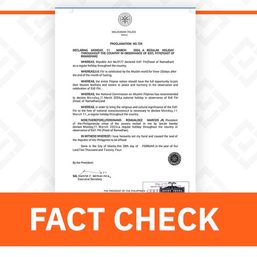SUMMARY
This is AI generated summarization, which may have errors. For context, always refer to the full article.

President Rodrigo Duterte’s office has ordered a reduction in on-site capacity for government offices in Metro Manila and other areas under general community quarantine (GCQ) from March 22 to April 4.
Malacañang released Memorandum Circular No. 85 on Friday, March 19, amid a surge in COVID-19 cases.
It states that government agencies and government corporations in GCQ areas “shall observe a minimum of 30% up to a maximum of 50% operational capacity at any given time.”
The only exception is if a higher capacity is needed for the provision of health and emergency frontline services, border control, and “other critical services,” reads the memo.
Operational capacity means the number of employees or workers physically reporting to work in the agency’s premises.
Malacañang go-signal needed for lockdowns
The same Palace order now requires government agencies to get Malacañang’s approval before implementing any lockdown of their office due to transmissions detected there.
“The head of agency shall submit to the Office of the President a request for clearance to shut down their premises, including the duration of such measure, which must be supported by verified data,” reads the memorandum circular.
“No closure shall be implemented until such clearance is obtained from the Office of the President,” it adds.
Any violation of this order could lead to administrative sanctions for the agency head.
Currently, agency heads like department secretaries can order the temporary closure of their offices by themselves. Requiring Malacañang approval will likely entail a longer process and a delay in implementing lockdowns for disinfection purposes.
It’s not clear, for example, if the Palace will have to verify the data submitted by agency heads to justify a proposed lockdown.
A delay in implementing a lockdown could mean that employees in the affected office would have to continue on-site work despite a positive case already confirmed among the staff.
The Department of Trade and Industry’s own guidelines state the importance of a timeline in disinfection of offices when a positive case is detected.
A workplace has to be locked down 24 hours before disinfection in order to protect sanitation workers. A workplace can only be opened 24 hours after disinfection. Thus, any delay in decision-making on whether or not to go on lockdown could also delay when the government office can resume on-site operations. – Rappler.com
Add a comment
How does this make you feel?


![[EDITORIAL] Dapat makinig si Marcos kay UN special rapporteur Irene Khan](https://www.rappler.com/tachyon/2024/02/animated-un-marcos-human-rights-elcac-carousel.jpg?resize=257%2C257&crop=327px%2C0px%2C720px%2C720px)


There are no comments yet. Add your comment to start the conversation.